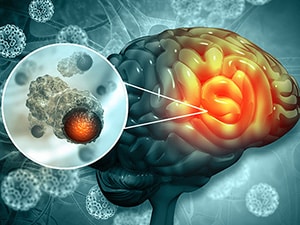First IDH Inhibitor for Astrocytomas and Oligodendrogliomas
The FDA has approved vorasidenib to treat certain brain tumors harboring an IDH1 or IDH2 mutation.
The U.S. Food and Drug Administration (FDA) has approved vorasidenib (Voranigo) for the treatment of adult and pediatric patients 12 years and older with grade 2 astrocytoma or oligodendroglioma with certain mutations in isocitrate dehydrogenase (IDH) 1 or IDH2. Vorasidenib is approved to be given after a surgery that removes the entire tumor, removes part of the tumor, or includes a biopsy.

Vorasidenib is a targeted therapy that inhibits certain mutated forms of IDH1 and IDH2, proteins that help cells make energy. Mutations in IDH1 or IDH2 can help cancer cells grow and spread more quickly. This is the first FDA approval for vorasidenib and the first targeted therapy approved for the treatment of grade 2 astrocytomas and oligodendrogliomas.
The approval was based on results from the randomized, multicenter, double-blind, placebo-controlled, phase III INDIGO clinical trial. Researchers enrolled 331 patients with grade 2 astrocytoma or oligodendroglioma harboring a susceptible IDH1 or IDH2 mutation who had undergone surgery for their glioma but had not received any other prior cancer treatments. Patients were randomly assigned (1:1) to receive either vorasidenib or a placebo until disease progression or unacceptable toxicity.
Patients in the vorasidenib arm were 61% less likely to experience disease progression or death than patients in the placebo arm. Further, patients in the placebo arm went a median of 17.8 months before needing another form of treatment, but the median time to next treatment was not reached in the vorasidenib arm.
The recommended dose of vorasidenib in adults is 40 mg orally once per day until disease progression or unacceptable toxicity. For pediatric patients, the recommended dose is 40 mg once daily for children weighing 40 kg or more and 20 mg once daily for children weighing less than 40 kg.
Astrocytoma and oligodendroglioma are types of glioma, a brain tumor that can arise in children and adults. Astrocytomas arise from star-shaped cells called astrocytes that support the neurons. Oligodendrogliomas arise from oligodendrocytes, which make a substance called myelin that covers the nerves. In recent decades, grade 1-3 astrocytomas accounted for 18.8% of gliomas diagnosed in the United States, while oligodendrogliomas accounted for approximately 10.7%.
The FDA rendered its decision on August 6, 2024.
